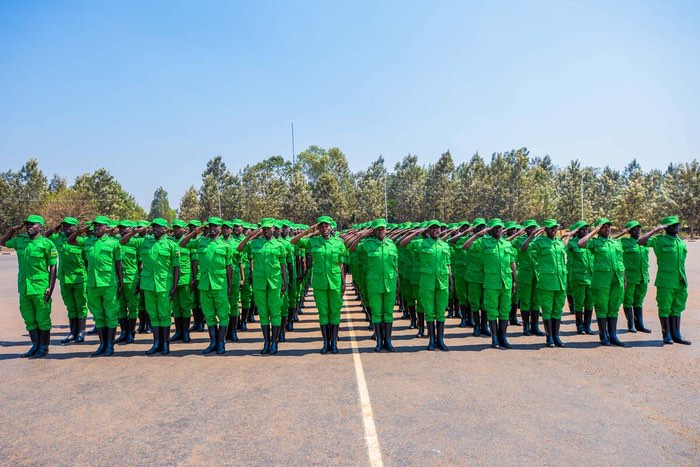
As evening falls in the clean and green Kigali, the sun sinks beneath the horizon, casting a warm glow over the city as its lights begin to twinkle. In this tranquil setting, a dedicated group of citizens takes to the streets—not equipped with sirens or official insignia, but rather clad in reflective vests and armed with flashlights, driven by a steadfast commitment to safeguard their communities.
These ordinary individuals embody Rwanda’s spirit of vigilance, diligently watching over their neighborhoods, one attentive glance at a time.
In a time when crime adapts faster than resources can keep up, Rwandans are proving that safety doesn’t always begin at a police station—it starts at home, on your street, on your social media, and within your sense of civic duty.
Across Kigali and four provinces of our country, a grassroots revolution in public safety is underway. From youth volunteers to digital neighborhood watch networks, citizens are not just supporting law enforcement—they are reshaping what it means to be safe.
As the Inspector General of Police (IGP) CG Felix Namuhoranye put it: “Security is everyone’s responsibility; it is a shared duty. Criminals live among us — they strike within our communities, harming the very people of the same community. They aim to disrupt peace we all value. That is why every citizen must take an active role in safeguarding their neighborhood, standing united with law enforcement to prevent and confront crime making the first and strongest line of defense.”
The volunteers are often the first to show up at community events, share safety information, and mobilize peers during emergencies. They are not just preventing crime—they are creating a culture of care.
“Irondo ry’Umwuga”: The Night Shift Heroes
In many Rwandan villages, the hum of nightly patrols has become a familiar sound. Known as Irondo ry’Umwuga—professional community night patrols—these community-led teams take charge of safety. Armed with flashlights and whistles, they navigate their neighborhoods during peak hours, acting as first responders and the community’s eyes and ears.
“We realized we can’t expect the police to be everywhere, every time,” says irondo sector commander from Nyarugenge. “So we became our brothers’ and sisters’ keepers.”
These patrols are not ad hoc efforts. They are organized, locally funded, and supported by local authorities and Rwanda National Police (RNP), reflecting a partnership model that values cooperation over command.
Youth Volunteers: Over a Million Strong Force Multiplier
If safety is the foundation of progress, Rwanda’s youth are its builders. With over 1 million members, the Rwanda Youth Volunteers in Community Policing (RYVCP) are making waves of success and community development nationwide. These young people—students, professionals, and future leaders—are participating in awareness campaigns, crime detection, and educational outreach.
Digital Vigilance: Social Media as the New Walkie-Talkie
In an age where smartphones are everywhere, neighborhoods connect faster and smarter. Social media platforms with hundreds of active members are being used to report suspicious activity, coordinate patrols, and issue safety alerts. They are our online soldiers and law enforcers.
“Someone saw a strange car outside our estate at midnight,” recounts a resident of Remera. “Within minutes, others chimed in, and a patrol was on the way. That’s the power of the community and digital watchdogs.”
These digital platforms—also popular in Rwanda’s secondary cities—are closing the gap between awareness and action. Social media has become a vital force multiplier in crime detection and prevention.
Training Tomorrow’s First Responders
Safety is not just about being vigilant—it is also about being prepared. That is why Rwanda National Police and partners are rolling out training sessions on first aid, self-defense, and emergency response across the country.
Workshops on fire safety, road safety awareness, and disaster response are empowering citizens with skills that once belonged only to professionals and particular institutions. It is not just a transfer of knowledge—it is a transformation of mindsets.
A Nation of Bystanders and Protectors
What Rwanda is witnessing is not merely a campaign—it is a cultural shift. Security experts and sociologists agree that when people feel responsible for their surroundings, crime has little space to breathe.
“A web of accountability is forming,” says a sociologist at the National Police College. “It’s not just about catching wrongdoers—it’s creating communities where wrongdoing doesn’t stand a chance.”
Moreover, that web is being reinforced from the top down. The Ministry of Interior encourages citizen engagement, commending community policing committees for their vigilance and urging the youth to uphold the values of integrity and responsibility.
More than Peace—Pride
For many citizens, the reason they patrol, report, and volunteer is not complicated. It is pride.
“We want our kids to grow up safely,” says a mother of two, tightening her reflective vest before heading out on patrol. “And if that means walking a few hours every evening to protect our home, then so be it.”
Her words echo the spirit of a country writing its safety narrative—one act of community courage at a time. In Rwanda, safety has a new face, and it is yours, mine, and ours. (End)
